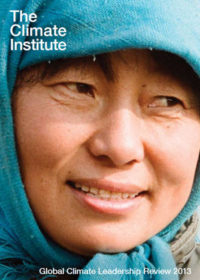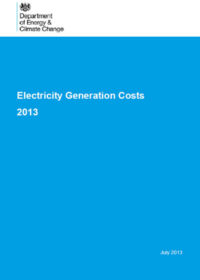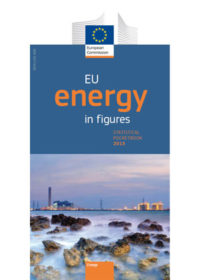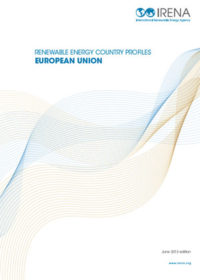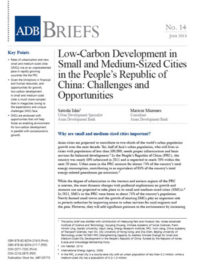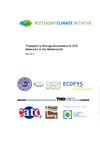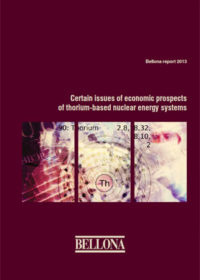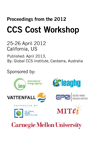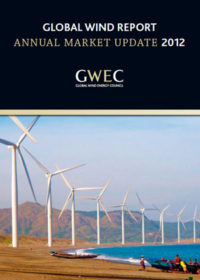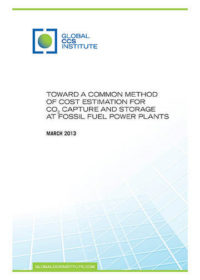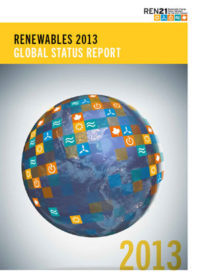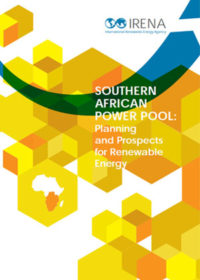Resources
Publications
Our publications, reports and research library hosts over 500 specialist reports and research papers on all topics associated with CCS.
View our Publication Library Disclaimer.
Filter by
Global Climate Leadership Review 2013 puts Australian climate policy in the context of ongoing international action to address climate change. It examines international action across several strands: it identifies which nations are leading the transition to a low-carbon economy; the dynamics and outcomes of intergovernmental climate negotiations; and the implications of all of these for Australia.
Disclaimer
The content within the Global CCS Institute Publications, Reports and Research Library is provided for information purposes only. We make every effort and take reasonable care to keep the content of this section up-to-date and error-free. However, we make no claim as to its accuracy, currency or reliability.
Content and material featured within this section of our website includes reports and research published by third parties. The content and material may include opinions and recommendations of third parties that do not reflect those held by the Global CCS Institute.
Electricity generation costs are a fundamental part of energy market analysis, and a good understanding of these costs is important when analysing and designing policy. The United Kingdom’s Department of Energy and Climate Change regularly updates estimates of the costs and technical specifications for different generation technologies used in its analysis. Cost data is broken down into detailed expenditure per MW capacity or MWh generation for the full lifetime of a plant including planning costs, construction costs, operating costs and eventual decommissioning costs.
Disclaimer
The content within the Global CCS Institute Publications, Reports and Research Library is provided for information purposes only. We make every effort and take reasonable care to keep the content of this section up-to-date and error-free. However, we make no claim as to its accuracy, currency or reliability.
Content and material featured within this section of our website includes reports and research published by third parties. The content and material may include opinions and recommendations of third parties that do not reflect those held by the Global CCS Institute.
EU energy in figures: statistical pocketbook 2013
1st June 2013
Topic(s): Economics, Energy efficiency, Renewables, Wind energy
The data contained in this pocketbook is drawn from several sources; the European Commission’s services; international organisations, such as the European Environment Agency and the International Energy Agency and, where no data is currently available, from the European Commission’s estimations.
Disclaimer
The content within the Global CCS Institute Publications, Reports and Research Library is provided for information purposes only. We make every effort and take reasonable care to keep the content of this section up-to-date and error-free. However, we make no claim as to its accuracy, currency or reliability.
Content and material featured within this section of our website includes reports and research published by third parties. The content and material may include opinions and recommendations of third parties that do not reflect those held by the Global CCS Institute.
Renewable energy country profiles: European Union
1st June 2013
Topic(s): Domestic policy, Economics, Renewables
Renewable Energy Country Profiles provide a comprehensive picture of the situation with regard to renewable energy, including energy supply, electrical generation and grid capacity, and access. Energy policies, targets and projects are also considered, along with each country’s investment climate and endowment with renewable energy resources.
Disclaimer
The content within the Global CCS Institute Publications, Reports and Research Library is provided for information purposes only. We make every effort and take reasonable care to keep the content of this section up-to-date and error-free. However, we make no claim as to its accuracy, currency or reliability.
Content and material featured within this section of our website includes reports and research published by third parties. The content and material may include opinions and recommendations of third parties that do not reflect those held by the Global CCS Institute.
Low-carbon development in small and medium-sized cities in the People’s Republic of China: challenges and opportunities
1st June 2013
Topic(s): Economics, Renewables
This Asian Development Bank Brief explains that Asian cities are growing, facing complex financial and human resources limitations, and could subsequently couple low-carbon development with socioeconomic growth.
Disclaimer
The content within the Global CCS Institute Publications, Reports and Research Library is provided for information purposes only. We make every effort and take reasonable care to keep the content of this section up-to-date and error-free. However, we make no claim as to its accuracy, currency or reliability.
Content and material featured within this section of our website includes reports and research published by third parties. The content and material may include opinions and recommendations of third parties that do not reflect those held by the Global CCS Institute.
Transport & storage economics of CCS networks in the Netherlands
22nd May 2013
Topic(s): CO2 storage, CO2 transport, Economics
A team from the Rotterdam Climate Initiative, CATO-2 (the Dutch national R&D programme on CCS) and the Clinton Climate Initiative, developed a financial model to assess the economics of alternative CO2 transport and storage options in the North Sea, based on common user infrastructure. The purpose of the financial model that is available on the Global CCS Institute website is to introduce a simple planning tool relating to the transport and storage components of an integrated CCS project using readily available, non-confidential data.
A steering group of major emitters with advanced plans for CCS projects in the Netherlands and Belgium guided the project. Although the report focusses on potential projects in the Netherlands (Rotterdam and Eemshaven) and Belgium (Antwerp) in the short to medium term, the analysis and lessons could be useful to other regions considering CO2 network solutions.
Disclaimer
The content within the Global CCS Institute Publications, Reports and Research Library is provided for information purposes only. We make every effort and take reasonable care to keep the content of this section up-to-date and error-free. However, we make no claim as to its accuracy, currency or reliability.
Content and material featured within this section of our website includes reports and research published by third parties. The content and material may include opinions and recommendations of third parties that do not reflect those held by the Global CCS Institute.
Certain issues of economic prospects of thorium-based nuclear energy systems
1st April 2013
Topic(s): Economics, Nuclear energy, Nuclear fission
Thorium-based nuclear fuel is thought to play a variety of roles depending on a particular nuclear energy system, which makes it challenging to form judgments regarding the economic prospects of thorium.
Disclaimer
The content within the Global CCS Institute Publications, Reports and Research Library is provided for information purposes only. We make every effort and take reasonable care to keep the content of this section up-to-date and error-free. However, we make no claim as to its accuracy, currency or reliability.
Content and material featured within this section of our website includes reports and research published by third parties. The content and material may include opinions and recommendations of third parties that do not reflect those held by the Global CCS Institute.
Proceedings from the 2012 CCS cost workshop: 25-26 April 2012, California, US
1st April 2013
Topic(s): Carbon capture use and storage (CCUS), Economics, Public engagement
The third meeting of the Expert Group on CCS costs was held on April 25-26 2013 and hosted by the Electric Power Research Institute in Palo Alto. The current understanding of the costs of CCS was presented at that meeting and the agreed outcomes for the Group to take forward are included in this document.
This work program consists of efforts to improve both the transparency of CCS cost calculations and the broader challenges associated with conveying messages around costs to the broader community.
The meeting focused on a number of issues including considering guidelines and recommendations developed by a Task Group for a costing method and nomenclature that could be broadly adopted to produce more consistent and transparent cost estimates for CCS applied to electric power plants; along with how to evaluate emerging process as well as transport, storage and utilization.
Topics discussed over the two days included:
- What are the main reasons for the reported costs of CCS demonstrations being significantly higher than the numbers in published CCS cost studies?
- What information would be useful to have from demonstration projects to help improve the published cost estimates?
- Should transport and storage form part of the work program to harmonize cost methods and nomenclature? And if so, what cost elements can be harmonized?
- How should ‘enhanced oil recovery’ storage operations be incorporated in harmonization efforts for storage? Alternatively, do the cost categories vary compared to saline formations?
- What types of methodologies are used to estimate costs for emerging processes?
- What kind of information should be reported in order to understand ‘what lies behind’ economic evaluations of emerging processes?
- How is the mix of commercially proven and modifications to commercially proven technologies best handled in terms of estimating equipment costs?
- How can uncertainties and risks be assessed in relation to estimated costs?
Disclaimer
The content within the Global CCS Institute Publications, Reports and Research Library is provided for information purposes only. We make every effort and take reasonable care to keep the content of this section up-to-date and error-free. However, we make no claim as to its accuracy, currency or reliability.
Content and material featured within this section of our website includes reports and research published by third parties. The content and material may include opinions and recommendations of third parties that do not reflect those held by the Global CCS Institute.
Global wind report: annual market update 2012
1st April 2013
Topic(s): Domestic policy, Economics, Wind energy
This is the eighth annual report on the status of the global wind industry by the Global Wind Energy Council. It provides a comprehensive snapshot of the global industry, now present in about 79 countries, with 24 countries having more than 1,000 MW installed. The data, insights and analysis for the country profiles in this report have been collected primarily through GWEC’s member associations and companies around the world, as well as from governments and independent analysts.
Disclaimer
The content within the Global CCS Institute Publications, Reports and Research Library is provided for information purposes only. We make every effort and take reasonable care to keep the content of this section up-to-date and error-free. However, we make no claim as to its accuracy, currency or reliability.
Content and material featured within this section of our website includes reports and research published by third parties. The content and material may include opinions and recommendations of third parties that do not reflect those held by the Global CCS Institute.
Toward a common method of cost estimation for CO2 capture and storage at fossil fuel power plants
30th January 2013
Topic(s): Carbon capture use and storage (CCUS), Economics
There are more than 100 papers in the public domain on the costs of CCS. However, there are significant differences in the methods employed by various organizations to estimate the cost of CCS systems for fossil fuel power plants. Many of these differences were discussed at a series of workshops, commencing in 2011, through which an international group of experts from industrial firms, government agencies, universities, and environmental organizations met to share information and perspectives on CCS costs for electric power plants.
Such differences often are not readily apparent in publicly reported CCS cost estimates. As a consequence, there is a significant degree of misunderstanding, confusion, and misrepresentation of CCS cost information, especially among audiences not familiar with the details of CCS costing.
A key recommendation of the first workshop was that a task force be formed to develop guidelines and recommendations for a costing method and nomenclature that could be broadly adopted to produce more consistent and transparent cost estimates for CCS applied to electric power plants.
Commencing in late 2011, and Chaired by Ed Rubin, task force members George Booras (EPRI), John Davison (IEAGHG), Clas Ekstrom (Vattenfall), Mike Matuszewski (USDOE/NETL), Sean McCoy (IEA) and Chris Short (Global CCS Institute) prepared a White Paper outlining both differences that exist in many current studies as well as providing guidelines and procedures for CCS costing, encompassing the full chain of CCS.
The aim of the work is not to suggest or recommend a uniform set of assumptions or premises for CCS cost estimates. There are good reasons why the cost of a given technology may vary from one situation to another and from one location to another. Rather, the sole objective is to help all parties with an interest or stake in CCS costing do a better job by addressing the major deficiencies in current costing methods, especially differences in the items included in a cost analysis.
The report addresses six major topics relevant to CCS costs
- defining project scope and design
- defining nomenclature and cost categories for CCS cost estimates
- quantifying elements of CCS cost
- defining financial structure and economic assumptions
- calculating the costs of electricity and CO2 avoided
- guidelines for CCS cost reporting
Disclaimer
The content within the Global CCS Institute Publications, Reports and Research Library is provided for information purposes only. We make every effort and take reasonable care to keep the content of this section up-to-date and error-free. However, we make no claim as to its accuracy, currency or reliability.
Content and material featured within this section of our website includes reports and research published by third parties. The content and material may include opinions and recommendations of third parties that do not reflect those held by the Global CCS Institute.
Renewables 2013 global status report
1st January 2013
Topic(s): Domestic policy, Economics, Geothermal energy, Global Status Report, Hydroelectricity, Marine energy, Policy law and regulation, Renewables, Solar energy, Wind energy
The Renewables Global Status Report provides a comprehensive and timely overview of renewable energy market, industry, investment, and policy developments worldwide. It relies on the most recent data available, provided by a network of more than 500 contributors and researchers from around the world, all of which is brought together by a multi-disciplinary authoring team. The report covers recent developments, current status, and key trends; by design, it does not provide analysis or forecasts.
Disclaimer
The content within the Global CCS Institute Publications, Reports and Research Library is provided for information purposes only. We make every effort and take reasonable care to keep the content of this section up-to-date and error-free. However, we make no claim as to its accuracy, currency or reliability.
Content and material featured within this section of our website includes reports and research published by third parties. The content and material may include opinions and recommendations of third parties that do not reflect those held by the Global CCS Institute.
Southern African power pool: planning and prospects for renewable energy
1st January 2013
Topic(s): Economics, Renewables
This report presents a study describing the transition of national power systems to a renewables-oriented future over the period 2010 to 2050 in the Southern African Region, which could be implemented by realising the long-term cost reduction potential of renewable technologies.
Disclaimer
The content within the Global CCS Institute Publications, Reports and Research Library is provided for information purposes only. We make every effort and take reasonable care to keep the content of this section up-to-date and error-free. However, we make no claim as to its accuracy, currency or reliability.
Content and material featured within this section of our website includes reports and research published by third parties. The content and material may include opinions and recommendations of third parties that do not reflect those held by the Global CCS Institute.
